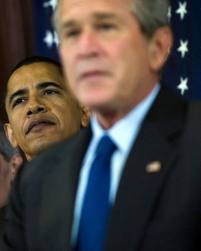The Prosecution of Tony Blair and George W Bush: Day 2 of the Kuala Lumpur War Crimes Tribunal

Day Two Kuala Lumpur War Crimes Tribunal: PNAC, Downing Street Documents; Bush Book Feature as Smoking Guns
KUALA LUMPUR WAR CRIMES TRIBUNAL: SMOKING GUNS PRESENTED
PNAC, Downing Street Documents; Bush Book all Smoking Guns on Conspiracy to go to War Against Iraq
20 November 2011 – On Day Two of the Kuala Lumpur War Crimes Tribunal, the Prosecution presented its evidence of the Bush, Blair decisions to go to war on falsified “intelligence” of Iraqi manufacture and possession of weapons of mass destruction. In the official setting of the Tribunal courtroom, Lead Prosecutor Gurdial Singh Nijar skillfully walked the Judges through all of the decision points that led up to the invasion of Iraq by the United States and the United Kingdom. Using publicly available government and think tank documents; books written by the principals, themselves, and others involved in the scandal; and transcripts of governmental inquiries, the Prosecution made it clear that President Bush and Prime Minister Blair both knew that there were no weapons of mass destruction in Iraq after 1991, but chose to go to war, anyway.
Winding us from Secretary Powell’s dramatic, but deceitful, United Nations testimony, and through the various memoirs of Bush, Blair, Powell, Cheney, Plame, and more, the Prosecution led us ultimately to think tank pronouncements of the need for a war against Iraq and regime change there that pre-dated the September 11, 2001 tragedies (The Project for a New American Century), that were skillfully used as an excuse for military aggression. Professor Francis Boyle added to the official record the case of Lieutenant Ehren Watada who was court-martialed because of his refusal to go to Iraq and fight because in Watada’s view, the war against Iraq was a war of aggression and violated U.S. and international law. Lt. Watada court-martial ended with an Honorable Discharge after the legality of the Iraq War was argued in the military court. Professor Boyle, continuing for the Prosecution, reminded the Court that this verdict should serve as a precedent for their consideration, although they are not bound by that decision as they are by the International Court of Justice decision against the United States and in favor of Nicaragua where the court ruled that regime change was illegal.
The Prosecution used Prime Minister Blair’s book, “A Journey,” Valerie Plame’s book, Fair Game,” (in which she describes how she was outed as a Central Intelligence Agency asset by her own government), Donald Rumsfeld’s “known and Unknown,” and President Bush’s “Decision Points” to indict both Blair and Bush. Lead Prosecutor Nijar also noted the contrition of the protagonists in these volumes: Powell is sick, Bush is in pain, but millions of Iraqi people are dead and millions more lead shattered lives as their country is still being destroyed.
The Prosecution concluded that the war against Iraq was engaged with arrogance and audacity, committing U.S. and British soldiers to an area to kill or be killed, and in complete disregard for international law. The Prosecution concluded:
“We trust that we have presented beyond a reasonable doubt how Bush and Blair connived and conspired to go to war.” The Prosecution asked that the Tribunal’s findings be sent to the International Criminal Court for their information and action and urged individual states to exercise universal jurisdiction “if ever these war criminals appear on their shores; include the names of these two accused in the Commission’s register of war criminals, and inscribe them in the publications of this Tribunal should they be found guilty.”

